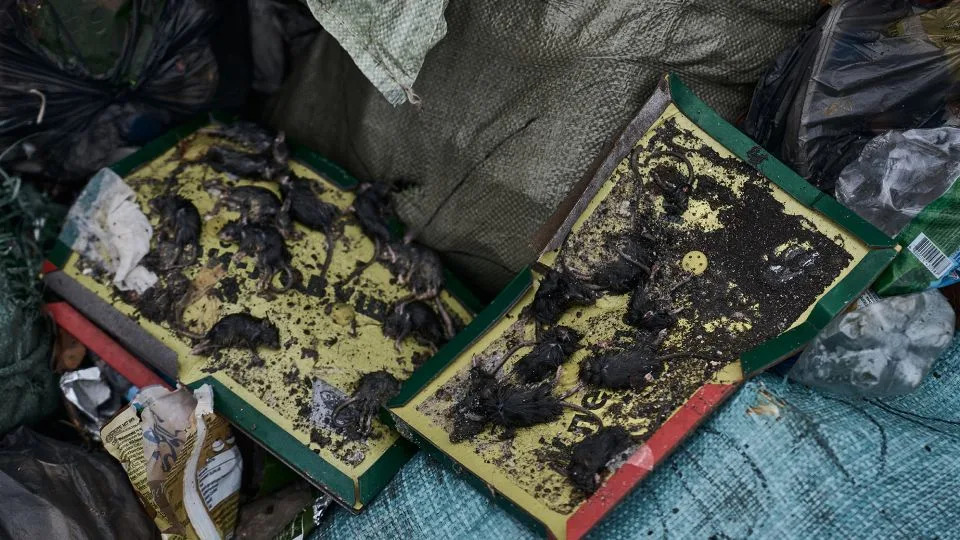Colorado Sun – News, Immigration
On a dead-end street in north Denver, migrants are surviving winter with the help of an army of volunteers
As the city reinstates time limits on hotel stays, volunteers are making plans to help hundreds more migrants in camps
Jennifer Brown – January 22, 2024

Footprints in the snow lead from the sidewalk to a path through the weeds, opening to a field that is almost invisible from the road.
North of Interstate 70, in a part of Denver filled mostly with warehouses and gas stations, the tents are flapping relentlessly in the wind. About 10 migrants from South America hunkered down here during four days of subzero temperatures, and the volunteers who brought them heaters and propane, hot meals and fresh water, are prepared to help hundreds more as Denver pushes migrants out of their city-provided hotel rooms in the coming weeks.
The dozen or so brightly colored tents were mostly concealed from view by the field’s dirt mounds, despite that they were just across the South Platte River from the National Western Stock Show, one of Denver’s biggest events of the year. As the city stayed home during last week’s deep freeze, the Venezuelans and other South Americans in the encampment zipped into sleeping bags and gathered in a “warming tent” to play dominoes and eat a pot of homemade noodle soup.
The camp lasted about two weeks, until Friday, when crews from Denver Parks & Recreation arrived and helped the migrants bag up their belongings and dismantle the tents.
They moved a couple of blocks away, out of the field and at the dead end of a street to nowhere.
The men in the encampment, near Washington Street and East 50th Avenue, are among the few migrants who are still living outside after the city’s massive effort to get migrants indoors before the January freeze and snowfall. Because of the cold, Denver paused time limits on stays in the seven hotels it has rented out for migrants, but that pause is ending Feb. 5 after the number of people staying in hotels has surpassed 4,300.
Hundreds of people — including families with children — will have to leave their hotel rooms in the coming weeks.

They were offered mats in city shelters, hotel rooms and even to go home with some of the volunteers who stop by to make sure they survived another frigid night. But they chose to stay outside for various reasons — because sleeping mat to mat makes them anxious, because they didn’t want to leave their belongings or lose their campsite, because they would rather try to make it on their own, no matter how cold.
“The snow makes you shiver so much you can’t talk or anything,” said Kevin Bolaño, who is from Colombia. “Sometimes we go out to shake the tents around and remove the snow.”
Bolaño, 33, arrived in Denver just over a month ago, one of 37,600 migrants, mostly Venezuelans, who have come through the city in the past year. He spent his allotted 14 days in a hotel room, then camped outside the Quality Inn in northwestern Denver until earlier this month, when city crews bused more than 200 people in that sprawling camp to shelters and scooped left-behind tents, mattresses and furniture into garbage bins.
Bolaño, a chef who specializes in Chinese dishes, wants to work in a restaurant or for a construction company, but he has struggled so far because he does not have a work permit. “If we were working for a company, we would not be here in the cold,” he said.
He left his home in Colombia, where he lived with his parents and children, because of terrorism and poverty, he said. “The government wanted all of a person’s salary. The food went up, the services and the houses went up and nothing was enough,” Bolaño said in Spanish. “It makes a person want to leave their own country in order to be able to help the family they left behind.”

On a blustery day last week, Bolaño smoked a cigarette in his tent with Elis Aponte, 47, who left Venezuela to escape discrimination he felt as part of the LGBTQ community. “Here, people don’t bully me,” said Aponte, who arrived in Denver four months ago and is now living in a house with a friend after weeks in a hotel and then an encampment along the sidewalk.
In Venezuela, Aponte studied radiology and forensic anthropology, and worked in a morgue. But like many migrants, he has struggled to find work here without the required legal documents. Still, Aponte said he is glad he made the journey to the United States.
“There is a lot of good stuff here,” he said in Spanish. “The only bad thing was that we arrived in a season when the snow was coming. I wear one, two, three sweaters and a jacket here, and even with all that, it’s cold. But I like Denver.”
They likely would not attempt surviving a Colorado winter outside, though, if it weren’t for the local army of volunteers who drive them to get showers and bring the propane needed to keep the heaters running in every sleeping tent and community warming tent.

Denver locals mobilize to help via social media
The calls to help Hugo, the lone man left in an encampment under a north Denver bridge near West 48th Avenue and Fox Street, went out daily.
“We need someone to bring Hugo a hot meal for dinner tonight after he gets home from work,” volunteer Chelsey Baker-Hauck posted on a migrant support Facebook page. “He may also need drinking water and some additional propane for tonight. He has a thermos you can also fill with hot water so he can make coffee/cocoa.”
Not long after her post, another Denver resident who is part of the “mutual aid” network responded that he would bring Hugo dinner and fresh water as soon as he finished work.
The Facebook page has 1,200 members and counting, hundreds of whom are actively helping, Baker-Hauck said. She and others started the page as an encampment began to spread under a bridge in their north Denver neighborhood. For weeks, they were delivering hot food and blankets, helping migrants find apartments and taking them into their homes.
“If they choose to stay outside,” she said, “we try to help them stay alive.”

It was devastating, Baker-Hauck said, when the city posted notice that crews would clean up the camp last Thursday. Ahead of the cold snap, the city offered bus rides to shelters and hotels. But Hugo, who has no vehicle and found steady work in construction within walking distance of the bridge, refused to go.
For a week, volunteers packed up tents, gathered and washed coats and clothing, and saved paperwork left behind as the migrants — all but Hugo — rushed to take buses to shelters. The volunteers want to return it to the people who left the camp or save it for other migrants who end up on the street when their hotel stays expire, Baker-Hauck said. Either way, they didn’t want the city to stuff it all in the trash.
“When the city does it, everything goes in the garbage,” she said. “It’s a lot of waste.”
The tents and winter gear will likely go to other encampments, including the one near the Denver Coliseum, Baker-Hauck said.
The group operates under the “mutual aid” concept, meaning no one is in charge and everyone pitches in when they can. Baker-Hauck posts the needs of the day, and people respond. When the deep freeze began, a volunteer called the mayor’s office and said she had 15 people who were freezing at a camp near Tower Road and East 56th Avenue. The mayor’s staff made room inside a city building near Civic Center park that was opened as a migrant shelter a couple of weeks ago.
Then Baker-Hauck asked the volunteer group if anyone could pick up the migrants and drive them to shelter. Nine drivers went out in the subzero temperatures.
“They responded within minutes,” she said. “It was amazing.”
As for Hugo, he finally agreed to stay with Baker-Hauck as the city crews were coming to clean up what was left of the camp. His first night in her home, Hugo took a hot shower, called his family in Ecuador and asked if she had any books in Spanish that would teach him about Colorado history.
He insisted on walking to work, an hour each way.
Families will get 42 days in hotel rooms
The camp near the Stock Show has its own set of volunteers, including Amy Beck, a Denver resident who for years has been helping the city’s homeless population through her group, Together Denver. She focused her efforts on migrants in the past few months because they were so unprepared for the cold weather and it was so upsetting to her to see children in tents.
Beck chose the vacant field in the weeds, then helped coordinate efforts to gather tents and propane deliveries. She spent the past weekend helping set up the new camp in a culdesac that backs up to the field after city officials cleared the first one. Each sleeping tent has a Little Buddy propane heater, and the community tent — with a table in the center for meals and games — has a 20-pound propane tank that keeps it surprisingly warm.
“It’s so warm, you have to take your coat off,” she said.
Still, Beck and fellow volunteers say they have done everything they can to persuade people to move indoors. At the encampment, she pulled out her phone to show the men photos of unhoused friends she brought to the hospital for amputations last spring because of frostbite. One man lost both of his feet; another lost all of his toes.
The volunteers offer bus tickets to warmer cities, rooms in their homes, calls to Denver Human Services to find housing.
“As a last resort, we set them up in a tent,” Beck said.

She helped set up the encampment as the city dismantled the one outside the Quality Inn, which had stretched multiple blocks in the Highland neighborhood, across Interstate 25 from downtown. That camp, Beck said, was “complete mayhem,” with tents lining the sidewalk and blocking traffic, and dozens of nonprofits and volunteers coming by daily with breakfast burritos, medicines and boxes of snow boots.
“Having children in tents, that crosses the line for me,” she said. “I can’t bring myself to go through a city sweep with children present. Children are not criminals, but that’s the law of Denver.”
Beck liked the new encampment because it was so out of the way. Volunteers have collected 200 tents, which they expect to fill in the coming weeks as people time out of hotels. They said they will squeeze more into the encampment near the Stock Show and look for other spots as needed. Individuals get 14 days, while families get 42 days.
They are going to exit everyone who queued up during the severe weather. That is going to be disastrous.
— Amy Beck, volunteer
“They are going to exit everyone who queued up during the severe weather,” Beck said. “That is going to be disastrous. That said, we are prepared. It’s not going to be super comfortable but we will be able to make a very good attempt to keep everyone safe.”
She wants the city, since the Stock Show ended Sunday, to turn the Denver Coliseum into a shelter as it did during the height of the COVID pandemic. “We’re hoping the city is going to make some humane decisions,” Beck said.
The city has no plans for that, as of now.
“All options are on the table, but there’s nothing happening with that space at the moment,” said Jon Ewing, spokesman for the Denver Department of Human Services.
Denver Parks & Recreation said they provided 48 hours notice that they would clear the camp in the field Friday. “Park rules do not allow individuals to set up tents or structures of any kind so as to ensure that public parks remain open for all,” spokesperson Yolanda Quesada said via email.
In November and December, Denver was receiving multiple busloads and 100-200 migrants per day, mostly from Texas. The buses keep coming, though the pace is now from 20-100 people per day.
“I’m getting the sense that this is not going to be resolved any time soon,” Beck said.

Migrants in apartments facing steep rent after initial aid runs out
Volunteers are also helping hundreds of migrants who have moved into apartments in the Denver area, many of them with help from the city and nonprofits to pay their deposit and first month’s rent.
Shari Spooner, who runs a marketing agency in Denver and has family in Venezuela, started volunteering with an organization called Para Ti Mujer when migrants began arriving in Colorado. “It pulls at my heartstrings, obviously,” she said.
Spooner delivers donated clothes and gift cards to Venezuelans around the metro area, and helps navigate bureaucracy to help people get information about unpaid wages and health care. She recently directed a pregnant woman to Denver Health, after explaining to her that she could receive care without insurance or citizenship.
The woman lives with her husband and children in an apartment that costs $2,400 per month, though the first two months have been covered by the city and a foundation. Spooner worries about how they will make rent when the third month is due, especially after the woman’s husband was cheated out of his wages for construction work.
“The vast majority of the people I’ve met and helped are looking for jobs,” Spooner said. “They are looking to be part of Colorado and build their life here in a positive way. They just need that first step. I think it’s important for people to know that.”

Some of the men in the encampment near the Stock Show are hoping to share apartments once they earn enough money. For now, they say they are content staying put.
Daniel Escalona, 21, said he does not want to sleep in a shelter where there are wall-to-wall mats on the floor and regular outbursts among people crowded into the room. And the heaters at the encampment are keeping him warm enough.
“We don’t want to sleep here,” said Escalona, who traveled from Venezuela on his own. “With a job, I can rent an apartment. But if I don’t get a job, I cannot.”
Jennifer Brown writes about mental health, the child welfare system, the disability community and homelessness for The Colorado Sun. As a former Montana 4-H kid, she also loves writing about agriculture and ranching. Brown previously worked at the Hungry Horse News in Montana, the Tyler Morning Telegraph in Texas, The Associated Press in Oklahoma City, and The Denver Post before helping found The Sun in 2018.
Read More:
Decades of inaction left a water system in southwestern Colorado in shambles. Will the state step in to help?
January 24, 2024
Colorado has the nation’s third-longest waitlist for people charged with crimes and ordered into psychiatric treatment
January 24, 2024















